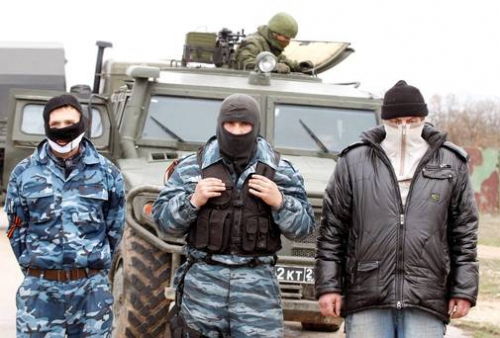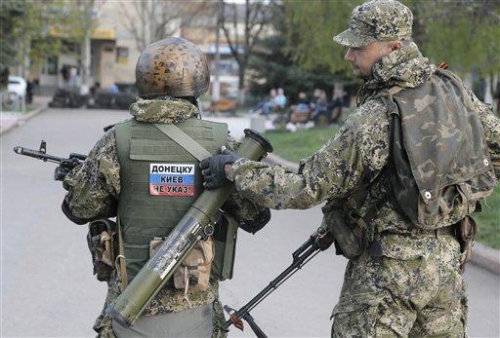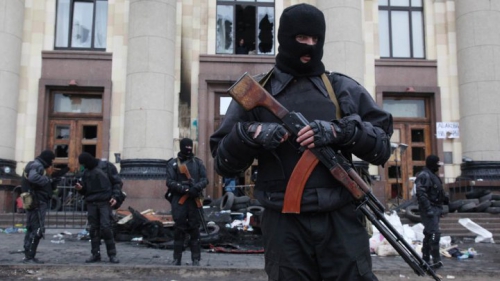Steven Pifer, a senior fellow at Brookings, writes “The West, including the United States, needs to get serious about assisting Ukraine if it does not wish to see the situation deteriorate further. That means committing real money now to aid Ukraine’s defense.” (
He’s dead wrong. No matter who is in the right or wrong in Ukraine, the U.S. shouldn’t intervene further. It shouldn’t have intervened in the first place.
Escalation by the U.S. and European powers will make matters worse. As a general rule, U.S. interventions make matters worse and fail to achieve even their advertised goals, about which one may also be rightly skeptical. See, for example, this 1994 article arguing a case for the futility of U.S. interventions.
U.S. interventions tend to intensify wars, resulting in more and worse civilian casualties and refugees, more and greater destruction, and more and greater military casualties.
U.S. interventions result in a more powerful state at home. Wars and related interventions on any scale establish precedents for greater powers of the state. The idea of using the state to eradicate or ameliorate evils takes root. This idea leads to government that knows no ideological limits, because evils are everywhere both here and abroad. As time passes, the state then applies its enhanced powers in whatever spheres of American life turn out to be politically favorable. The result after many interventions and decades is a warfare-welfare-regulatory state, a spying-police state, and a state with a massive propaganda apparatus. The departments of the federal government control every significant sector of American life.
Intervention after intervention by government embeds the idea that we the people need the government for the sake of our safety and security. This is a totally false idea.
In the case of Ukraine, U.S. intervention over the past has already gone wrong. (There is evidence that U.S. intervention goes back for 70 years.) It has led to sanctions on Russia. This policy is completely wrong. Confrontation with Russia is completely against the interests of Americans. What good does it do to create a world of hostile relations, a world divided, a world with some nations cut off and isolated from others, and a world in which great powers are rivals over a set of lesser nations? The benighted policy of sanctions has already resulted in inducing Russia to solidify relations with China, Greece, Turkey and Iran. As such state-to-state actions go in this world of states, these moves are not remarkable; but in a context in which the U.S. regards these new economic and military relations as hostile, we are seeing the genesis of Cold War II. This is bad, and it’s the direct result of U.S. intervention in Ukraine, the U.S. position on Ukraine and the sanctions on Russia. These sanctions are really unthinkable.
Advice like that of Steven Pifer, which seeks to expand the U.S. role in Ukraine into military confrontation with Russia, could not be more wrong. Its main result will be to escalate the conflict into one between two major powers. The Ukrainian people, east, west, north and south, will suffer.
The two sides are both going outside for help, as often happens in civil wars. The U.S. should stop being one of those outsiders providing aid, arms or help to one of the battling sides. This recommendation does not hinge on Russia’s actions. It doesn’t hinge on Crimea, on the downing of MH17, or on Russian tanks, artillery or personnel, volunteers or regulars. It doesn’t hinge on borders, the history of Ukraine and Russia, Neo-Nazis, democracy, or perceived rights and wrongs. Non-intervention is based on the idea that the U.S. government should not be in the business of righting evils that it identifies, domestic or foreign.
At a fundamental level, a philosophy of law and government is the issue. Each of us as persons, if we so choose, can identify evils and decide what to do about them. No one of us has willingly or voluntarily deputized government persons to do this for us. There are no documents, contracts, or legal instruments that I or anyone else have signed that have chosen government personnel as our agents and instructed them to intervene in Ukraine. There are no such signed and valid contracts that have given them the power to extract taxes from us to pursue their quests, visions and crusades. In other words, such interventions are not legitimate. They are not legitimated. They are thought to be and said by many persons to be legitimated by the Constitution and various rituals still pursued to this day, but they are not. The customs of many who support government and its attendant interventions do not make for or justify laws that are applicable to the many others who demur and dissent from the powers being imposed on them. Might does not make right. Majority rule does not make right. Legalisms propounded by might are not necessarily lawful, although they may accidentally be so. There really is no lawful link between you and me and a government action like intervening in Ukraine.

The U.S. intervenes in a hundred or more countries with various forms of “aid”, Ukraine being one of them. To quote one article:
“Since 1992, the government has spent about $5.1 billion to support democracy-building programs in Ukraine, Thompson said, with money flowing mostly from the Department of State via U.S. Agency for International Development, as well as the departments of Defense, Energy, Agriculture and others. The United States does this with hundreds of other countries.
“About $2.4 billion went to programs promoting peace and security, which could include military assistance, border security, human trafficking issues, international narcotics abatement and law enforcement interdiction, Thompson said. More money went to categories with the objectives of ‘governing justly and democratically’ ($800 million), ‘investing in people’ ($400 million), economic growth ($1.1 billion), and humanitarian assistance ($300 million).”
This article is making the point that the assistance was humanitarian and that it didn’t lead in a direct line to the coup d’etat against the democratically-elected government of Ukraine that has led to the current conflict, with its attendant miseries imposed on the population of that country. But whether or not that assistance or even earlier links of the CIA to elements in Ukraine contributed to Maidan, what these interventions purportedly do is to fight what the U.S. government regards as evils and institute various goods. Fighting evils is, however, precisely what the U.S. government has no business doing and should not be doing.
What these interventions do is to establish beachheads of the U.S. government in a long list of foreign countries. This often includes military beachheads. These beachheads provide options for the U.S. government that can be exercised in the future, including the options of further aid, further intervention and escalation when conflicts occur. These beachheads tie the U.S. government to foreign governments so that the U.S. government can exercise influence on those governments. Foreign governments become dependent on foreign aid, IMF loans, World Bank projects and other such infusions. But foreign governments then gain influence over the U.S. government. The U.S. institutions that benefit from the programs and links to foreign governments become dependent for their own livelihoods on these activities. They become proponents for a larger U.S. government that’s responsive to foreign demands and interests. The U.S. becomes more likely to become a proponent of foreign interests and to intervene further.
The Pentagon and U.S. military, lacking great purposes after the Cold War, readily embraced interventions along three lines: drug interdiction, fighting terrorism, and training foreign military forces, both here and abroad. The public relations or propaganda arms of the U.S. now say that these programs, which bring thousands of foreign military personnel to the U.S. for education, help instill American values and establish contacts between the U.S. and foreign military personnel. (See, for example, here.)
The military portion of the military-industrial complex promotes its own size and scope, so as to retain its access to resources extracted from taxpayers. It defines new missions and propagandizes them as important or essential. Interventions are its business. This is the case in Ukraine and other trouble spots. The military battens on trouble spots as do its suppliers. Promotions are helped by active duty, combat and missions engaged in, even if they are not missions accomplished. These interventions do no good to Americans who are outside the military-industrial orbit.

Pifer’s article is co-written with Strobe Talbott. Steven Pifer is a Senior Fellow at the Brookings Institution’s Center on the United States and Europe. He is Director of Brookings’ Arms Control Initiative. Strobe Talbott is President of the Brookings Institution. Six other members of the establishment join them in their recommendation, which includes supplying Ukraine with lethal aid, radar, anti-armor weapons, etc. These persons are “former U.S. representative to NATO Ivo Daalder, former undersecretary of defense Michèle Flournoy, former U.S. ambassador to Ukraine John Herbst, former deputy undersecretary of defense Jan Lodal, former NATO European commander James Stavridis and former U.S. European Command deputy commander Charles Wald.
All of these seem to have learned zip from previous escalations, such as occurred constantly throughout the Vietnam War. Their so-called expertise in foreign affairs is impossible to detect in their recommendation. Pifer is certainly not living up to his title relating to arms control. These members of the U.S. elite have not learned a thing from the escalation in Iraq that graduated from sanctions to outright aggressive war, from the escalation in Afghanistan which went from getting bin Laden to taking down the Taliban government, from the ongoing escalation in Syria that has produced ISIS and now is totally in confusion, from the escalation in Libya that wrecked the country and from the escalation in Yemen, a country now undergoing a change in government that the U.S. didn’t foresee. Along similar lines, there was no need for Americans to fight communism in Vietnam and there is no need for the U.S. government to fight the devils it perceives are operating in Ukraine.





 del.icio.us
del.icio.us
 Digg
Digg
Les commentaires sont fermés.